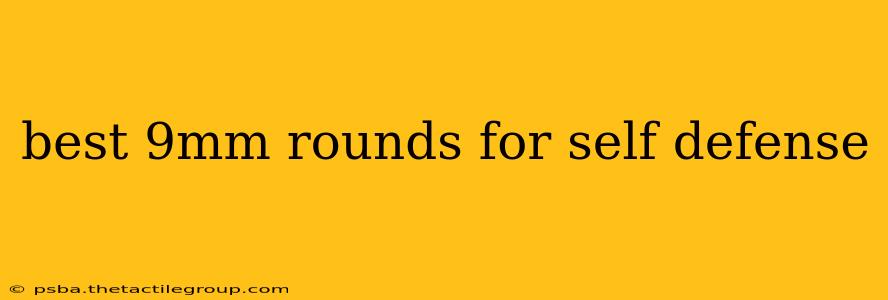Choosing the right ammunition for self-defense is a critical decision, and for 9mm handgun owners, the options can feel overwhelming. This guide dives deep into the best 9mm rounds for self-defense, considering factors like penetration, expansion, and overall stopping power. We'll explore various bullet types and help you make an informed choice based on your specific needs and firearm.
Understanding Key Factors in Self-Defense Ammunition
Before we delve into specific rounds, let's examine the crucial characteristics to consider when selecting self-defense ammunition:
-
Expansion: A bullet's ability to expand upon impact, creating a larger wound cavity and increasing the likelihood of incapacitation. This is crucial for minimizing the risk of overpenetration.
-
Penetration: The depth to which a bullet penetrates a target. Sufficient penetration is necessary to reach vital organs, while excessive penetration poses a risk to bystanders. The FBI recommends a minimum penetration depth of 12 inches in ballistic gelatin.
-
Stopping Power: The overall effectiveness of a round in incapacitating an attacker. This is a complex factor influenced by expansion, penetration, and the bullet's energy transfer.
-
Reliability: Consistent feeding and firing in your specific firearm is paramount. Always test your chosen ammunition extensively in your gun to ensure reliable function.
Top 9mm Self-Defense Rounds: A Detailed Look
Several excellent 9mm rounds consistently prove their effectiveness in self-defense situations. Here's a breakdown of some of the most popular choices:
1. Hollow Point Ammunition: The Foundation of Self-Defense
Hollow point (HP) bullets are the industry standard for self-defense. The hollow cavity in the bullet's nose promotes expansion upon impact, maximizing the wound cavity and energy transfer while minimizing overpenetration. Many variations of HP exist, each with its own characteristics.
- Advantages: Excellent expansion, reduced overpenetration risk, high stopping power.
- Disadvantages: Can be more expensive than full metal jacket (FMJ) rounds. Performance can vary based on the specific design and the material used.
2. Jacketed Hollow Point (JHP): A Popular Choice
Jacketed hollow points offer a balance between expansion and penetration. The copper jacket helps maintain bullet integrity and consistency, enhancing accuracy and reliability.
- Examples: Numerous manufacturers produce high-quality JHP rounds, including Federal HST, Speer Gold Dot, and Winchester Ranger T-Series. These are frequently cited as top performers in ballistic testing.
3. +P and +P+ Ammunition: Increased Power
"+P" and "+P+" designations indicate rounds loaded to higher pressures than standard 9mm ammunition. This results in increased velocity and energy, potentially leading to greater penetration and stopping power. However, it's vital to ensure your firearm is rated for +P or +P+ ammunition before using it. Using higher-pressure rounds in a firearm not designed for them can cause serious damage to the gun.
4. Specific Round Recommendations (with important caveats):
While specific brands are frequently recommended, the best round will ultimately depend on your firearm, testing, and personal preferences. It’s crucial to independently test various rounds in your firearm to determine what performs best. This involves controlled testing with a variety of targets and observation of bullet expansion and penetration.
Beyond the Bullet: Factors to Consider
-
Your Firearm: Not all 9mm handguns function reliably with all types of ammunition. Always test your chosen ammunition extensively in your firearm to ensure reliable feeding, firing, and accuracy.
-
Your Skill Level: Accurate shot placement is arguably more crucial than the specific type of ammunition used. Practice regularly and focus on developing your shooting skills.
-
Legal Considerations: Understand the laws and regulations regarding self-defense in your area. This includes understanding the legal ramifications of using force and the implications of different types of ammunition.
Disclaimer: This information is for educational purposes only and should not be considered legal or professional advice. Always consult with a qualified firearms instructor and legal professional before making decisions about self-defense ammunition. The choice of ammunition is a personal responsibility and should be carefully considered.

